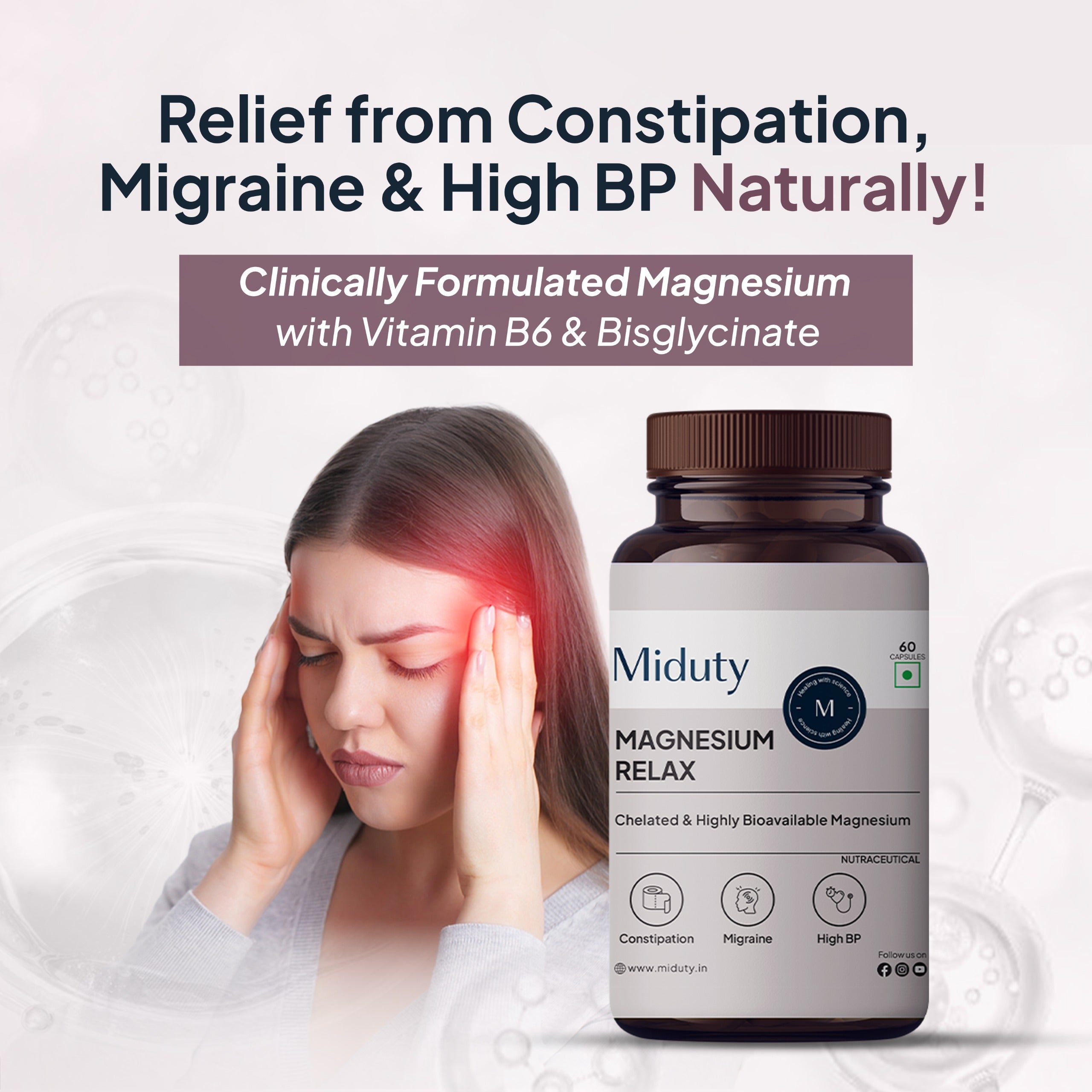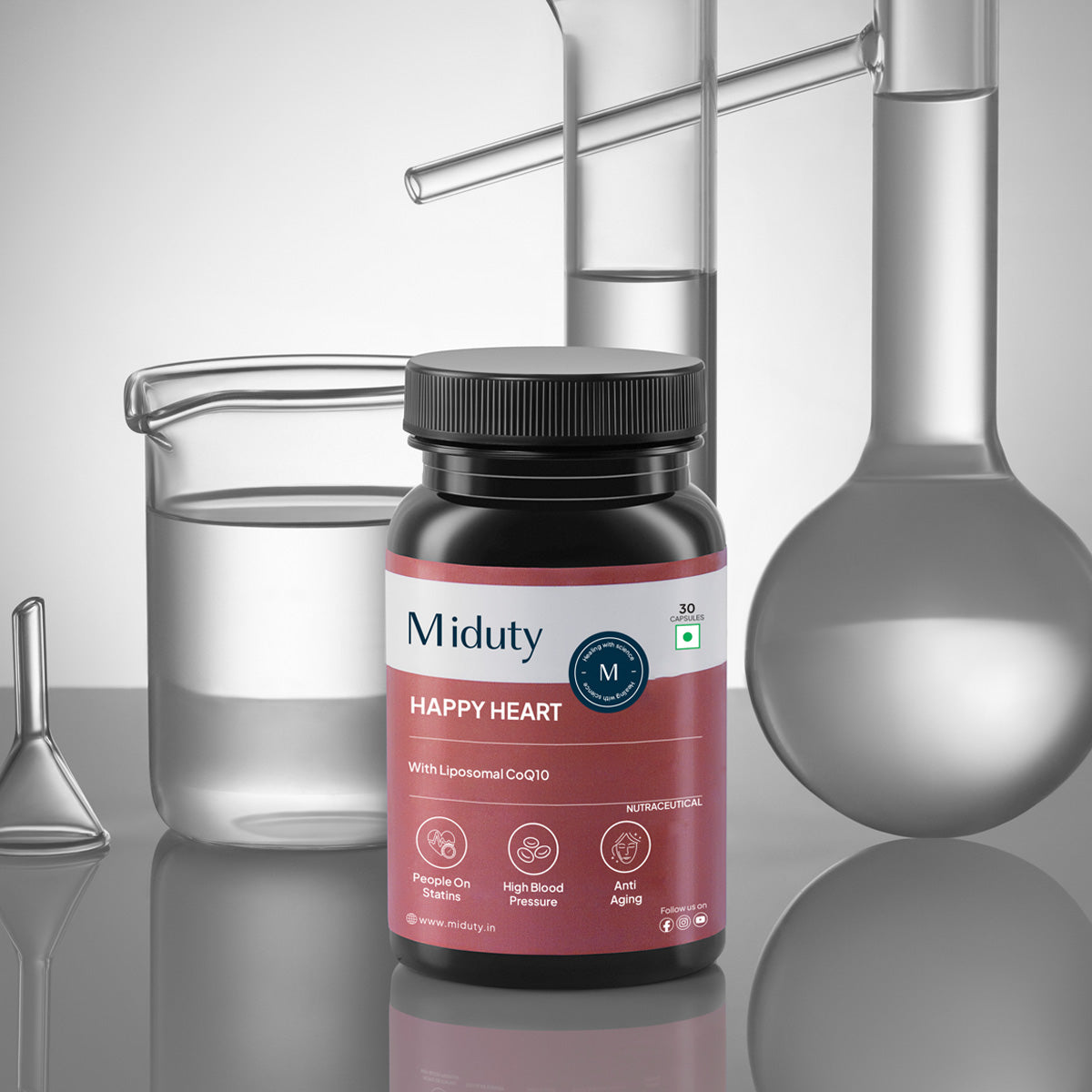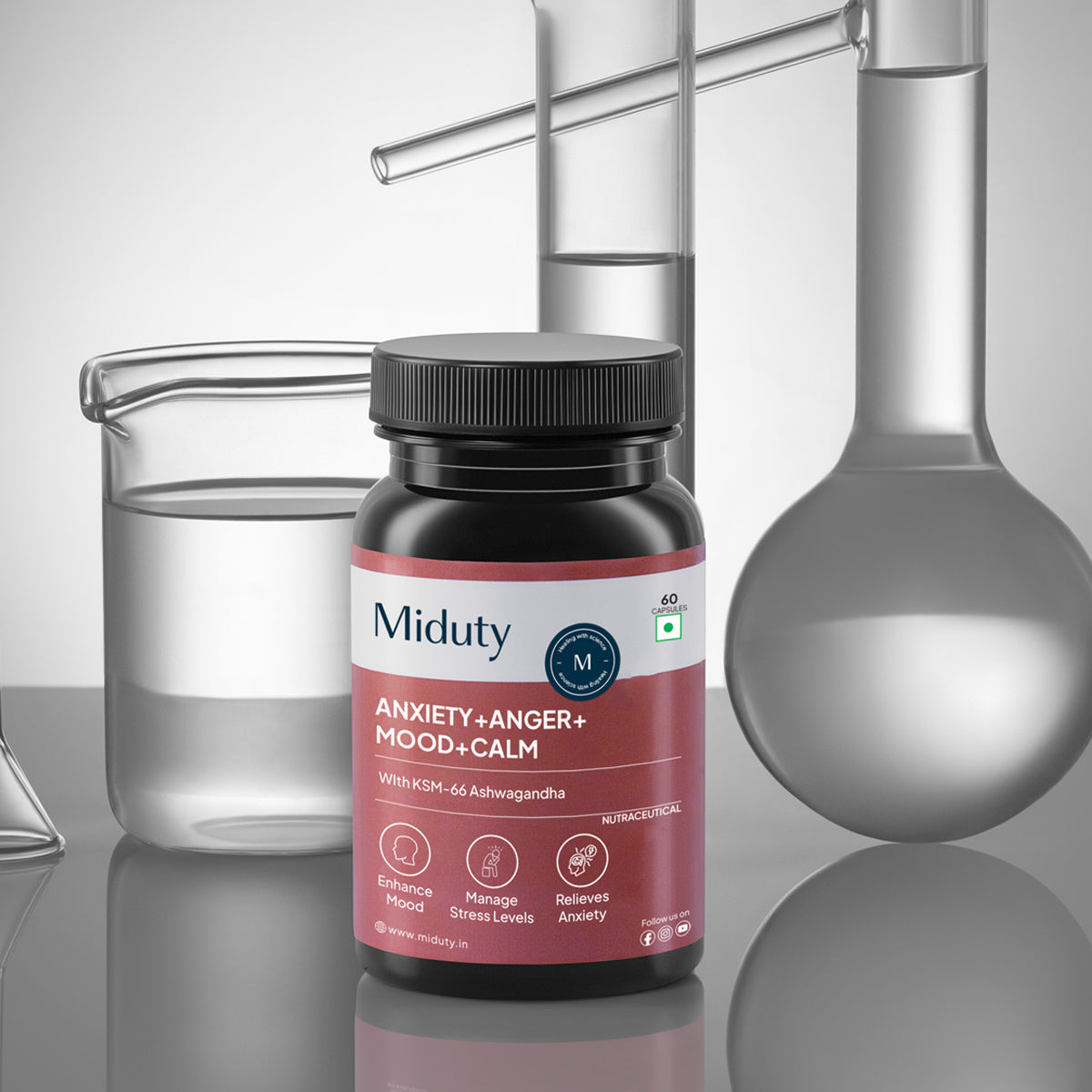
Magnesium Bisglycinate vs. Glycinate: What Should You Pick?
Magnesium might not be something you think about every day, but it's actually a big deal for your body. It's the fourth most abundant mineral we've got, and it's involved in over 300 different tasks, things like keeping your muscles working properly, helping your nerves fire right, and even making sure your energy levels don't crash.
Here's the thing: a lot of us are running low on magnesium without even knowing it. Thanks to our fast-paced lives, processed foods, and daily stress, our magnesium levels take a hit and that's why so many people are turning to supplements. But when you start shopping around, you might come across magnesium glycinate and magnesium bisglycinate… and wonder, "Wait, aren't those the same thing?" Well, not exactly.
Even though their names look almost identical, there are some key differences between the two. So in this post, we're going to break it all down in plain English, what each one really is, how they stack up against each other, and how to figure out which one is the better fit for you. Let's make this whole magnesium thing way less confusing.
Key Takeaways
1. Magnesium is your body's silent MVP, powering energy, muscles, nerves, and mood yet many people are unknowingly deficient.
2. Magnesium bisglycinate is the gold standard, offering top-tier absorption, zero laxative effect, and superior calm.
3. Glycinate might sound the same, but quality varies, always check if it's fully chelated for real results.
4. Need better sleep, stress relief, or muscle recovery? Magnesium bisglycinate checks all the boxes.
5. Read labels like a pro, look for "fully reacted" magnesium bisglycinate and ditch cheap, ineffective blends.
Why is Magnesium Crucial for the Body?
Magnesium is known as the "master mineral" because it supports nerve and muscle function, a steady heartbeat, strong bones, immunity, and hormonal balance. It's vital for energy production, glucose control, and protein synthesis. Today's stress, processed food, and poor soil quality make magnesium deficiency common—even in healthy diets. This mineral is also essential for mental health, as it regulates neurotransmitters that influence mood, sleep, and stress. Often called the "original chill pill," magnesium helps the body and mind stay balanced, making it one of the most important yet overlooked nutrients in modern life.
Symptoms of Magnesium Deficiency
A lack of magnesium often flies under the radar because the symptoms are vague and overlap with other health conditions. But make no mistake, your body will let you know.
Some common symptoms include: Muscle cramps and spasms, fatigue and weakness, anxiety and irritability, insomnia or poor sleep quality, headaches and migraines, irregular heartbeat and constipation.
Chronic deficiency can contribute to more serious conditions like hypertension, osteoporosis, type 2 diabetes, and cardiovascular disease.
That's where magnesium supplements come in but not all are created equally, which brings us to the battle between magnesium glycinate and bisglycinate.
What is Magnesium Glycinate?
Magnesium glycinate is a compound formed by combining elemental magnesium with glycine, an amino acid known for its calming properties. This combination creates a chelated form of magnesium, which means the mineral is bound to an organic molecule (glycine) to improve stability and absorption in the body.
The chelation process helps magnesium slip through the intestinal wall more efficiently. This means more magnesium actually gets into your bloodstream, not flushed out like with cheaper forms (looking at you, magnesium oxide).
One reason why magnesium glycinate is a favorite is its gentle nature. It doesn't typically cause digestive upset or laxative effects, unlike magnesium citrate or sulfate.
Uses and Benefits of Magnesium Glycinate
Because glycine has its own relaxing properties, magnesium glycinate is particularly popular among those dealing with anxiety, stress, and insomnia. The double-whammy of magnesium and glycine makes it a go-to supplement for people needing help winding down.
Its benefits include:
- Promoting restful sleep
- Reducing anxiety and irritability
- Easing muscle tension and cramps
- Supporting PMS relief in women
- Enhancing overall relaxation and recovery
It's also worth noting that glycine supports liver function and collagen synthesis, making this form potentially helpful for skin, joints, and detoxification.
What is Magnesium Bisglycinate?
Magnesium bisglycinate is actually a more precise term for what many people refer to as magnesium glycinate. The "bis" in bisglycinate indicates that two glycine molecules are bound to one magnesium ion. This matters because it reflects the actual molecular structure of the compound and how it's utilized in the body.
To be clear: when someone says magnesium glycinate, they're usually referring to magnesium bisglycinate. However, in some cases, "magnesium glycinate" might be used loosely to describe less pure forms or those bound to only one glycine molecule, which can alter absorption and effectiveness.
The bisglycinate form is the fully reacted, true chelated version. It's more stable and typically better absorbed. Think of it as the premium version of magnesium glycinate.
Uses and Benefits of Magnesium Bisglycinate
Magnesium bisglycinate is considered one of the most bioavailable and gut-friendly forms of magnesium on the market. Thanks to its stable chelation, it bypasses the usual pathways that lead to diarrhea, making it perfect for those with sensitive stomachs.
Top advantages include:
1. High bioavailability: It's absorbed efficiently and doesn't compete with other minerals during digestion.
2. Zero laxative effect: Unlike other magnesium forms, bisglycinate won't send you running to the bathroom.
3. Enhanced relaxation: With two glycine molecules, it offers a slightly stronger calming effect.
4. Therapeutic dosage: Because of its potency, you often need a smaller dose to achieve noticeable effects.
For people dealing with chronic stress, sleep disturbances, or muscle tension, magnesium bisglycinate is often the superior choice.
Key Differences Between Magnesium Bisglycinate and Glycinate
Though often used interchangeably, magnesium bisglycinate and magnesium glycinate are not exactly the same—and understanding the difference is key if you want the best results from your supplement.
Magnesium bisglycinate is the fully chelated form, meaning two glycine molecules are chemically bonded to one magnesium ion. This specific structure creates a highly stable compound that resists breakdown in the stomach, allowing more magnesium to reach the small intestine where absorption takes place. This chelation not only improves bioavailability but also makes bisglycinate much gentler on the stomach, causing minimal to no laxative effect, unlike some other forms like magnesium oxide or citrate.
On the other hand, magnesium glycinate is a broader term and doesn't always guarantee the same purity or potency. Some products labeled as "glycinate" may be partially reacted or simply blended with glycine, rather than being a fully chelated bisglycinate. These blends often don't provide the same level of absorption and may lead to inconsistent results. In fact, certain low-cost supplements may include magnesium oxide or other cheaper forms mixed with glycine to justify the "glycinate" label without delivering the benefits of true bisglycinate.
In a nutshell:
Magnesium Bisglycinate = Fully reacted, highly absorbable, minimal GI upset, consistent quality
Magnesium Glycinate = May be just as effective, but varies widely by brand and formulation
If you're using magnesium to support sleep, anxiety, muscle recovery, or digestion, choosing the right form matters.
Which One Should You Pick?
If you're trying to choose between the two, it depends on your health goals:
- For anxiety and stress relief, magnesium bisglycinate is ideal. Its strong calming effect helps regulate the nervous system and ease tension.
- For muscle recovery, both forms help, but bisglycinate's higher absorption means faster relief and less soreness.
- For sleep and relaxation, bisglycinate again wins thanks to its dual glycine content and ability to promote deeper, uninterrupted rest.
If your supplement is labeled only "glycinate," do your homework. If it's not a full chelate, it may not offer the same benefits.
How to Choose the Right Supplement?
Look past the buzzwords and focus on the label. A high-quality magnesium bisglycinate supplement will say things like: Fully reacted or chelated magnesium bisglycinate, No fillers, no magnesium oxide, and Third-party tested for purity. Dosage-wise, most people benefit from 200–400 mg of elemental magnesium daily. For best results: Take it in the evening to support relaxation. Be consistent and benefits build over time. Split larger doses to boost absorption.
Conclusion
When it comes to magnesium bisglycinate vs. glycinate, the real choice lies in product quality and your health needs. If you want the best absorption, fewer side effects, and reliable results for sleep, stress, and recovery, magnesium bisglycinate is your top pick. Just remember, not all supplements are created equal. Read labels carefully, stick to trusted brands, and stay consistent with your routine.
FAQ's on Magnesium Bisglycinate and Glycinate -
Q1 - Which is better magnesium bisglycinate or Glycinate?
Magnesium bisglycinate and glycinate are essentially the same, but bisglycinate is the more accurate scientific term. It's known for better absorption and being gentler on the stomach than other magnesium forms. When in doubt, opt for magnesium bisglycinate, it's generally preferred for its superior bioavailability and digestive tolerance.
Q2 - Who should not take magnesium bisglycinate?
Magnesium bisglycinate should be used with caution in individuals with kidney impairment or kidney disease, as reduced kidney function can affect magnesium clearance. Always consult your doctor before use.
Q3 - What is the best type of magnesium to take?
The best type of magnesium to take is magnesium bisglycinate due to its high absorption and gentle effect on the stomach. However, if you have specific needs like brain health or constipation, other forms like magnesium L-threonate or citrate may be more suitable.
Q4 - What is the downside of magnesium glycinate?
Magnesium glycinate is generally well-tolerated but may cause digestive issues like diarrhea, nausea, or cramps at high doses. Rarely, excessive intake can lead to low blood pressure, irregular heartbeat, or serious heart complications.
Q5 - Is magnesium bisglycinate good for sleep?
Yes, magnesium bisglycinate is good for sleep as it promotes relaxation, reduces stress, and supports the production of calming neurotransmitters like GABA. Its gentle, well-absorbed form makes it ideal for improving sleep quality without digestive side effects.
References












